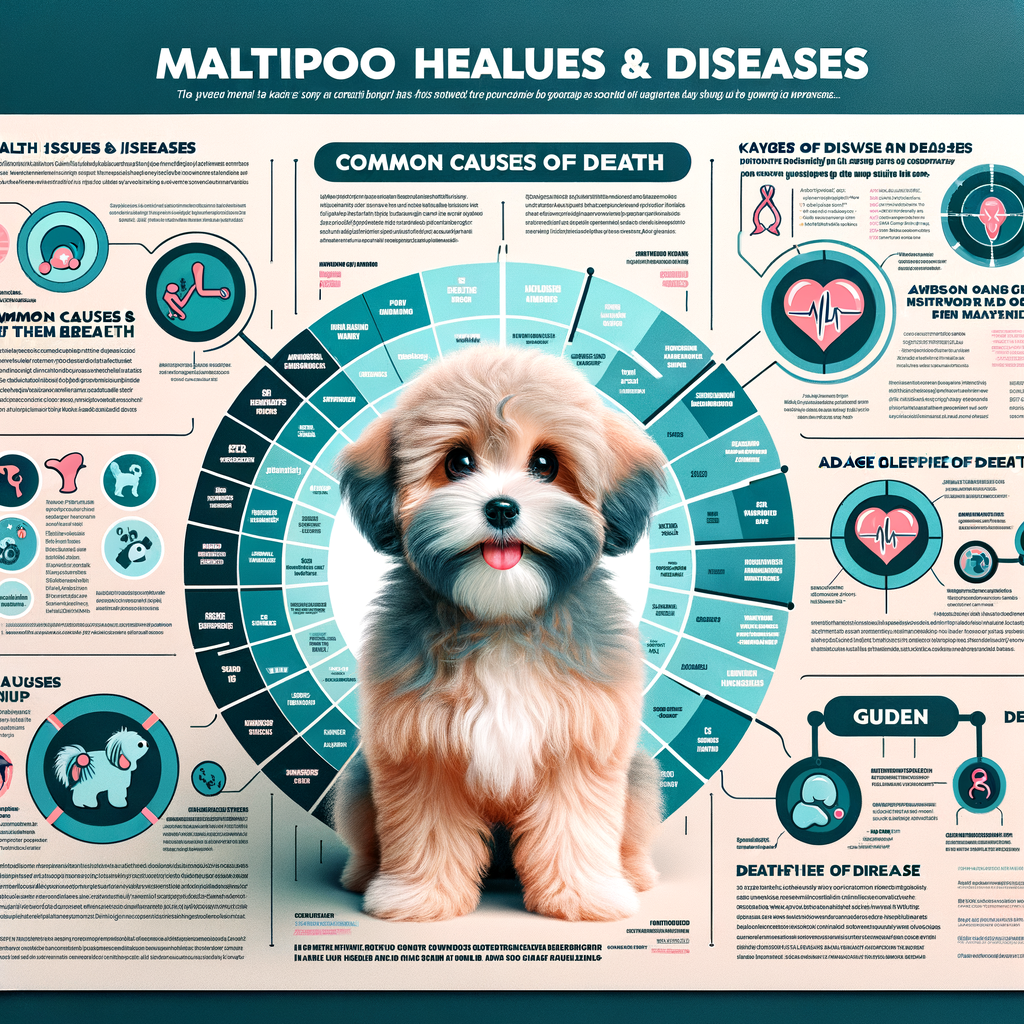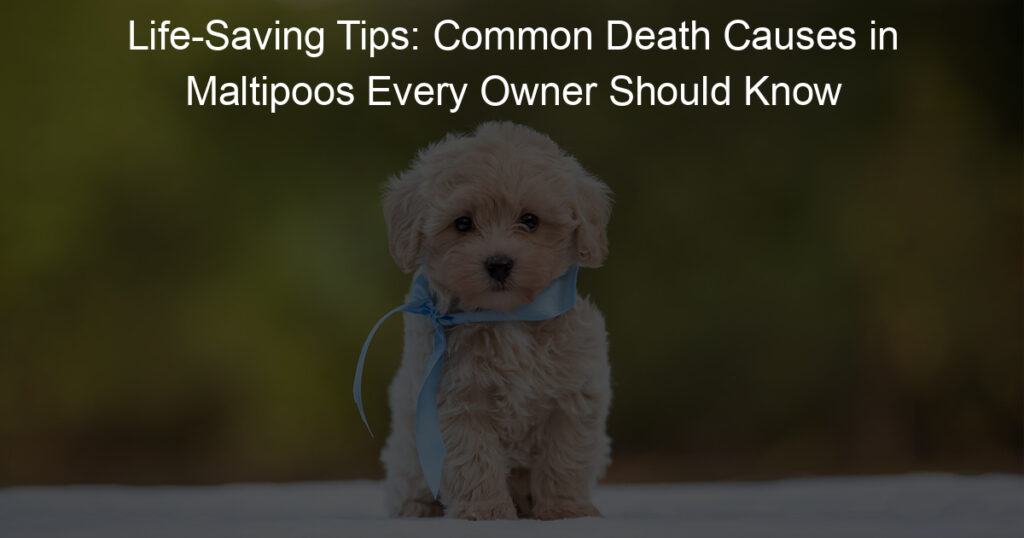
Introduction to Maltipoo Health Issues
As a Maltipoo owner, or someone considering bringing this adorable breed into your home, it’s crucial to understand the potential health issues that may affect your furry friend. In this section, we will provide an overview of Maltipoo health problems and emphasize the importance of understanding Maltipoo health care.
- Overview of Maltipoo health problems
- Importance of understanding Maltipoo health care
Maltipoos, a crossbreed between Maltese and Toy or Miniature Poodles, are generally healthy dogs. However, like any breed, they are prone to certain health conditions. These may include issues related to their eyes, skin, and joints, as well as genetic disorders that they may inherit from their parent breeds. It’s important to note that not all Maltipoos will get any or all of these diseases, but it’s crucial to be aware of them if you’re considering this breed.
Understanding the potential health issues that may affect your Maltipoo is the first step in providing them with a long, healthy life. Regular vet check-ups, a balanced diet, and adequate exercise can go a long way in preventing these issues. Additionally, being aware of the signs and symptoms of common Maltipoo health problems can help you catch them early, when they’re often easier to treat. In the following sections, we’ll delve deeper into the specifics of Maltipoo health care.
Remember, the best way to ensure your Maltipoo’s health is through preventive care and early detection. Stay informed, stay vigilant, and your Maltipoo will thank you with years of love and companionship.
Maltipoo Breed Information
The Maltipoo is a popular breed of dog, known for its friendly nature and adorable appearance. In this section, we will delve into the origins and characteristics of the Maltipoo breed, as well as discuss the typical lifespan of these charming pets.
- Origins and characteristics of the Maltipoo breed
The Maltipoo is a crossbreed, a mix between a Maltese and a Poodle. This breed was first developed in the United States with the aim of creating a low-shedding pet that would be suitable for people with allergies. The Maltipoo is a small dog, typically weighing between 5 to 20 pounds, and standing 8 to 14 inches tall at the shoulder.
Characteristically, Maltipoos are known for their friendly and affectionate nature. They are intelligent, which makes training them relatively easy. They are also known for their playful and energetic behavior, making them a great companion for both children and adults. Their coat can vary from wavy to curly and comes in a variety of colors including white, cream, and silver.
- Typical Maltipoo lifespan
The Maltipoo has a relatively long lifespan compared to other breeds. On average, a healthy Maltipoo can live between 10 to 15 years. However, with proper care, regular veterinary check-ups, and a balanced diet, some Maltipoos have been known to live up to 16 years or more.
It’s important to note that the lifespan of a Maltipoo can be influenced by various factors including genetics, diet, exercise, and overall health care. Regular vet visits and vaccinations can help ensure your Maltipoo lives a long and healthy life.
In the following sections, we will discuss common health issues, causes of death, and practical tips for caring for a Maltipoo to ensure their health and longevity.
Common Maltipoo Diseases
As a Maltipoo owner, it’s important to be aware of the common diseases that can affect your furry friend. In this section, we will discuss some genetic disorders that are prevalent in Maltipoos. Understanding these conditions can help you take better care of your pet and ensure their health and longevity.
Genetic Disorders
Genetic disorders are diseases that are passed down from a Maltipoo’s parents. These are not caused by any external factors but are inherent in the dog’s genes. Here are three common genetic disorders that Maltipoos may suffer from:
- White Shaker Syndrome
- Legg-Calve-Perthes Disease
- Patellar Luxation
This is a neurological disorder that causes a Maltipoo to shake uncontrollably. It’s called “White Shaker Syndrome” because it was first identified in small, white dogs. Symptoms include tremors, lack of coordination, and rapid eye movements. While this condition can be scary to witness, it’s usually manageable with medication.
Legg-Calve-Perthes Disease is a condition that affects the hip joint of the Maltipoo. It causes a decrease in the blood supply to the head of the femur (the large rear leg bone), which leads to the death of the bone cells and causes lameness. Treatment often involves surgery and physical therapy.
Patellar Luxation is a condition where the kneecap (patella) dislocates or moves out of its normal position. This can cause pain and lameness in the affected leg. In severe cases, surgery may be required to correct the problem.
Being aware of these genetic disorders can help you spot any unusual behaviors in your Maltipoo. Early detection is key to managing these conditions and ensuring your pet lives a happy and healthy life. Remember, regular vet check-ups are essential for early diagnosis and treatment.
Common Illnesses
Just like us, Maltipoos can also suffer from common illnesses. Let’s take a closer look at some of the most frequent health issues that can affect our furry friends.
- Ear Infections
- Dental Disease
- Eye Problems
Ear infections are a common issue for Maltipoos. This is due to their floppy ears which can trap moisture and bacteria. Signs of an ear infection include scratching at the ears, head shaking, and a foul smell. Regular cleaning can help prevent these infections.
Dental disease is another common health issue for Maltipoos. Small breeds like Maltipoos are more prone to dental problems due to the size and positioning of their teeth. Regular brushing and dental check-ups can help keep your Maltipoo’s teeth healthy.
Maltipoos can also suffer from a variety of eye problems. These can range from minor issues like tear staining to more serious conditions like progressive retinal atrophy. Regular eye checks can help catch any problems early.
While these illnesses are common, they can often be prevented or managed with regular veterinary care and a healthy lifestyle. Remember, a healthy Maltipoo is a happy Maltipoo!
| Common Illness | Prevention |
|---|---|
| Ear Infections | Regular ear cleaning |
| Dental Disease | Regular brushing and dental check-ups |
| Eye Problems | Regular eye checks |
Maltipoo Common Causes of Death
As a Maltipoo owner, it’s important to understand the common causes of death in this breed. This knowledge can help you take preventive measures to ensure your pet lives a long, healthy life. Here are the main causes:
- Accidents and Injuries
- Untreated Health Conditions
- Age-Related Diseases
Accidents and injuries are a leading cause of death in Maltipoos. These can include falls, car accidents, or injuries from other animals. Maltipoos are small and delicate, making them more susceptible to serious injury. Always keep an eye on your Maltipoo, especially when they’re playing or exploring outdoors.
Untreated health conditions can also lead to death in Maltipoos. These can range from dental diseases, heart conditions, to kidney problems. Regular vet check-ups are crucial to detect any health issues early and treat them before they become serious.
As Maltipoos age, they become more prone to certain diseases like arthritis, heart disease, and cancer. Regular vet visits and a healthy lifestyle can help manage these age-related diseases and improve your pet’s quality of life.
In conclusion, while accidents, untreated health conditions, and age-related diseases are common causes of death in Maltipoos, many of these can be prevented or managed with proper care, regular vet check-ups, and a healthy lifestyle. Your Maltipoo’s health is in your hands, so it’s important to be proactive in their care.
Maltipoo Health Care
When it comes to ensuring the health and happiness of your Maltipoo, there are several key preventive measures to consider. These measures can help to prevent common health issues and ensure your furry friend enjoys a long, healthy life.
Preventive Measures
Preventive health care is crucial for your Maltipoo’s overall wellbeing. Here are three essential preventive measures you should take:
- Regular Vet Check-ups
- Vaccinations
- Dental Care
Regular visits to the vet are vital to catch any potential health issues early. The vet can conduct a thorough examination and provide necessary treatments or recommendations. It’s advisable to schedule at least one vet visit per year, or more frequently if your Maltipoo has specific health concerns.
Vaccinations are a critical part of your Maltipoo’s health care. They protect your pet from various diseases, such as rabies, distemper, and parvovirus. Your vet can provide a vaccination schedule tailored to your Maltipoo’s needs and lifestyle.
Good dental care is essential for your Maltipoo’s health. Regular brushing can prevent dental diseases and bad breath. It’s also recommended to have your Maltipoo’s teeth professionally cleaned by a vet at least once a year.
By following these preventive measures, you can help ensure your Maltipoo stays healthy and happy. Remember, your Maltipoo relies on you for its health and wellbeing. So, make sure to provide the best care possible.
Nutrition and Exercise
Keeping your Maltipoo healthy involves more than just regular vet visits and vaccinations. It also includes proper nutrition and exercise. These two factors play a significant role in maintaining your pet’s overall health and well-being.
- Proper Diet
A balanced diet is essential for your Maltipoo’s health. It helps in maintaining a healthy weight, supports their immune system, and promotes a shiny coat and healthy skin. Your Maltipoo’s diet should consist of high-quality dog food that is rich in protein, carbohydrates, fats, vitamins, and minerals. It’s also important to monitor your pet’s calorie intake to prevent obesity, a common health issue in Maltipoos.
- Regular Exercise
Maltipoos are active and playful dogs that require regular exercise to keep them fit and healthy. Regular walks, playtime in the yard, and interactive toys can help keep your Maltipoo physically active. Exercise also helps to prevent obesity and related health issues such as heart disease and arthritis. It’s recommended that Maltipoos get at least 30 minutes to 1 hour of exercise per day.
- Mental Stimulation
Mental stimulation is just as important as physical exercise for Maltipoos. These intelligent dogs enjoy problem-solving games and toys that challenge their minds. Providing mental stimulation can help prevent behavioral issues and keep your Maltipoo’s mind sharp. You can provide mental stimulation through puzzle toys, training sessions, or games like hide and seek.
| Key Aspect | Importance | Recommendations |
|---|---|---|
| Proper Diet | Supports overall health and prevents obesity | High-quality dog food, monitor calorie intake |
| Regular Exercise | Keeps Maltipoo physically fit, prevents health issues | At least 30 minutes to 1 hour of exercise per day |
| Mental Stimulation | Prevents behavioral issues, keeps mind sharp | Puzzle toys, training sessions, games |
In conclusion, a proper diet, regular exercise, and mental stimulation are crucial for your Maltipoo’s health. By ensuring these aspects, you can contribute significantly to your pet’s well-being and longevity.
Caring for a Maltipoo: Practical Tips
When it comes to caring for your Maltipoo, there are several practical tips to keep in mind. These include training and socialization, grooming and hygiene, and providing a safe environment. Let’s delve into each of these areas.
- Training and Socialization
- Grooming and Hygiene
- Providing a Safe Environment
Training your Maltipoo should start at an early age. This breed is intelligent and eager to please, making them relatively easy to train. Use positive reinforcement techniques such as treats and praise to encourage good behavior. Socialization is also crucial. Expose your Maltipoo to different people, environments, and other animals to help them become well-rounded and confident.
Maltipoos have a beautiful, curly coat that requires regular grooming to keep it looking its best. Brush your Maltipoo’s coat daily to prevent matting and tangles. Regular baths are also necessary to keep their skin and coat healthy. Don’t forget about dental hygiene! Brush your Maltipoo’s teeth regularly to prevent dental diseases.
Providing a safe environment for your Maltipoo is crucial. This means ensuring your home is puppy-proofed, with no small objects that they could choke on. Also, make sure your yard is secure so your Maltipoo can’t escape. Remember, Maltipoos are small dogs and can easily get injured, so always supervise them during playtime.
In conclusion, caring for a Maltipoo requires time, patience, and love. By following these practical tips, you can ensure your Maltipoo is happy, healthy, and well-cared for.
Conclusion: Ensuring Your Maltipoo’s Health and Longevity
As we conclude, it’s vital to remember that the health and longevity of your Maltipoo largely depends on your actions. Two key factors stand out in this regard: regular health monitoring and the provision of love and care. Let’s delve into these aspects.
- Importance of Regular Health Monitoring
- Role of Love and Care in a Maltipoo’s Health
Regular health checks are crucial for your Maltipoo’s well-being. These checks help detect any potential health issues early, making treatment more effective. Regular vet visits should include routine vaccinations, dental check-ups, and heartworm tests. Also, maintaining a record of your Maltipoo’s health can help track any changes in behavior, appetite, or physical condition, which could be signs of underlying health issues.
Love and care play a significant role in your Maltipoo’s health and longevity. Maltipoos are known for their affectionate and playful nature. They thrive in environments where they receive ample love and attention. Regular playtime, positive reinforcement, and a comfortable living environment contribute to their overall well-being. Remember, a happy Maltipoo is a healthy Maltipoo.
In conclusion, the health and longevity of your Maltipoo are in your hands. Regular health monitoring and a loving, caring environment can significantly enhance your Maltipoo’s quality of life. Remember, your furry friend depends on you for its well-being. So, make every effort to provide the best care possible for your Maltipoo.








